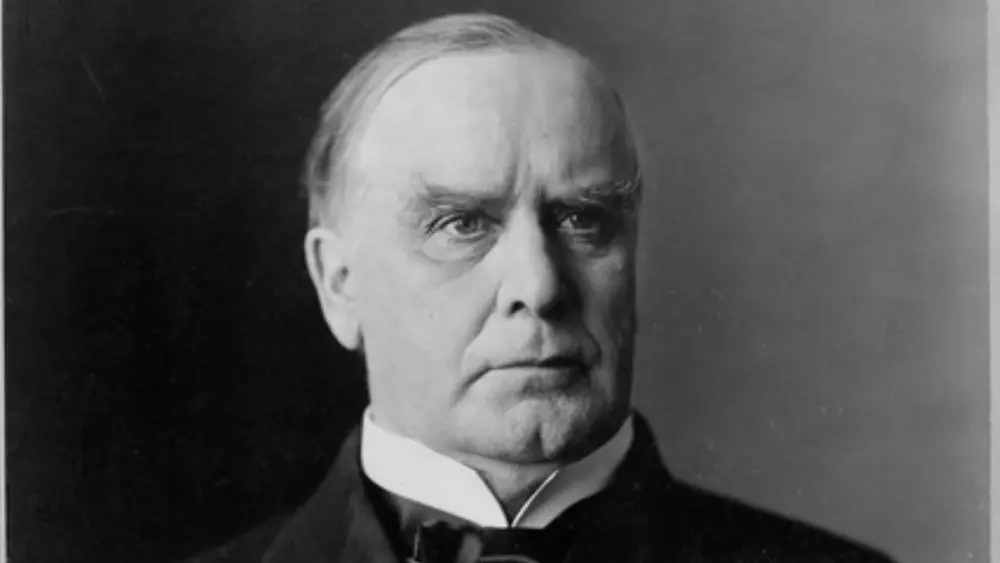William McKinley, the 25th President of the United States, is remembered for his leadership during a pivotal period in American history, marked by economic growth and international expansion. Born on January 29, 1843, in Niles, Ohio, McKinley’s life and presidency were defined by his dedication to economic prosperity, diplomacy, and the challenges of a rapidly changing world.
Early Life and Civil War Service
William McKinley’s early life was characterized by humble origins, born into a working-class family in Niles, Ohio. Despite limited financial resources, McKinley’s determination and strong work ethic set him on a path towards higher education. He attended Allegheny College for a time but was forced to leave due to financial constraints. Undeterred, he began a teaching career to support himself and eventually saved enough money to resume his education, this time at the Albany Law School in New York. McKinley’s legal studies led him to practice law, and he established himself as a successful attorney in Ohio.
However, McKinley’s life took a dramatic turn with the outbreak of the American Civil War. In 1861, he joined the Union Army and served with distinction as a member of the 23rd Ohio Infantry Regiment. Rising through the ranks, McKinley’s service included participation in key battles such as Antietam and the Battle of South Mountain. His bravery and leadership abilities were recognized, and he was promoted to the rank of major. The experience of the Civil War left a lasting impact on McKinley and instilled in him a sense of duty and patriotism that would influence his political career in the years to come.
William McKinley: Legal Career and Entry into Politics
Following his honorable service in the Civil War, William McKinley took a career in law and subsequently entered the world of politics. He honed his legal skills and established a successful legal practice in Canton, Ohio, contributing to his growing prominence in the community. McKinley’s foray into politics began with his election to the U.S. House of Representatives in 1876, representing Ohio’s 17th congressional district. His tenure in Congress began a long and distinguished political career. As a member of the House, he became known for his expertise in tariff policy, championing protective tariffs to support American industries. McKinley’s dedication to his constituents and proficiency in navigating complex legislative matters propelled him to re-election for several terms, solidifying his reputation as a skilled legislator.
William McKinley’s time in the U.S. House of Representatives laid the foundation for his ascent in American politics. His dedication to economic issues, particularly tariffs, earned him the nickname “The Tariff President” and would play a significant role in his future presidential administration. His entry into politics marked the beginning of a remarkable journey that would ultimately lead him to the highest office in the land, the presidency of the United States.
Tariff Policy and Economic Focus
During his tenure in Congress, William McKinley earned a reputation as a staunch advocate for protective tariffs, establishing himself as one of the foremost proponents of this economic policy. He believed protective tariffs were essential to safeguarding American industries from foreign competition and promoting economic growth and stability. McKinley’s commitment to tariff policy was rooted in his belief that it would protect domestic industries and bolster American workers and their wages. His leadership in this area earned him the moniker “The Tariff President.”
McKinley’s focus on tariff policy and his ability to navigate complex economic matters made him a prominent figure in American politics. His stance on tariffs resonated with certain segments of the electorate, particularly in industrial states, and played a pivotal role in his successful presidential run in 1896. As President, McKinley remained dedicated to tariff reform and signed the Dingley Tariff Act into law, further increasing protective tariffs. His economic policies, centered on tariffs and promoting American industry, continued to shape the economic landscape of the United States during his administration and left a lasting impact on the nation’s economic policy for years to come.
William McKinley: Governor of Ohio
William McKinley’s role as the Governor of Ohio was a pivotal chapter in his political career, significantly enhancing his national standing and setting the stage for his eventual run for the presidency. Serving as Ohio’s governor from 1892 to 1896, McKinley demonstrated effective leadership and governance skills, which garnered him widespread respect and recognition. During his tenure, he pursued policies to promote economic growth, support the interests of industry and labor, and maintain social order. His pragmatic and balanced approach to governance appealed to a broad cross-section of Ohioans, and his successful administration was marked by fiscal responsibility and effective management.
McKinley’s time as governor was instrumental in building the political momentum that eventually propelled him to the presidency. His accomplishments in Ohio showcased his ability to navigate the complexities of state government and implement policies that resonated with voters. Moreover, his reputation as a skilled leader who could deliver results made him a natural choice for the Republican nomination in the 1896 presidential election. The legacy of McKinley’s gubernatorial tenure elevated his political profile and established him as a formidable candidate for the highest office in the land, ultimately leading to his successful bid for the presidency in 1896.
Election as President
The 1896 presidential election marked a turning point in American politics, and William McKinley emerged as the Republican nominee with a compelling platform centered on economic stability and a commitment to the gold standard. McKinley’s campaign, facing off against the charismatic Democratic candidate William Jennings Bryan, characterized itself by emphasizing the maintenance of the gold standard as the basis for the nation’s currency. He believed this position would provide economic stability and instill confidence in American businesses and investors.
McKinley’s campaign also garnered significant support from industrial and business interests who saw in him a leader who would protect their economic concerns.
The election of 1896 resulted in a resounding victory for William McKinley, as he secured a decisive electoral college win over Bryan. McKinley’s victory reflected the support he received from both urban and rural constituencies, as well as his ability to convey a message of economic stability in a time of economic uncertainty. His presidency would go on to focus on economic and tariff policies, leaving an enduring impact on the nation’s economic landscape. The 1896 election solidified McKinley’s legacy as a president who steered the country through a critical period of economic change and political realignment.
William McKinley: Domestic Policy and Economic Prosperity
William McKinley steadfastly committed to economic stability and prosperity during his presidency. One of his most significant domestic policy achievements was the passage of the Gold Standard Act in 1900, which firmly established the gold standard as the basis for the U.S. currency system. Many saw this move as a key factor in ensuring confidence in the nation’s currency, attracting investment, and promoting economic growth. McKinley also championed protective tariffs, such as the Dingley Tariff Act, which aimed to protect American industries and create jobs. He guided his approach to domestic policy, believing that a strong and stable economy would benefit all Americans.
Under McKinley’s leadership, the United States experienced a period of remarkable economic growth and industrial expansion. The nation’s industrial output surged, unemployment declined, and wages rose. During McKinley’s presidency, a transition to an era of economic prosperity occurred, characterized by a booming manufacturing sector and increased foreign trade. His commitment to economic policies aimed at safeguarding American industries and maintaining fiscal stability left a lasting impact on the nation’s economic landscape, solidifying his legacy as a president who presided over a period of economic growth and prosperity.
Spanish-American War
The Spanish-American War of 1898 was a defining moment in William McKinley’s presidency, as it thrust the United States onto the world stage as a global power. A series of events, including the explosion of the USS Maine in Havana Harbor, which the American public blamed on Spain, and the fervor of the American public for Cuba’s struggle for independence from Spanish rule, ignited the conflict. McKinley, who initially sought a peaceful resolution to the tensions, eventually acceded to public sentiment and Congress’s call for military action. The war lasted only a few months and resulted in a decisive American victory, leading to the Treaty of Paris in December 1898. This treaty brought about the acquisition of several territories from Spain, including the Philippines, Guam, and Puerto Rico, and marked the beginning of the United States as a colonial power with a significant overseas empire.
The Spanish-American War profoundly affected the United States and the territories it acquired. While it expanded American influence and territory, it also sparked debates about imperialism, colonization, and the United States’ role in the world. The acquisition of the Philippines, in particular, led to a protracted and controversial conflict, the Philippine-American War, as Filipinos sought their own independence from American rule. The war significantly impacted McKinley’s presidency and the trajectory of American foreign policy, setting the stage for the nation’s involvement in global affairs in the 20th century.

William McKinley: Assassination and Legacy
William McKinley’s presidency tragically and abruptly ended when an assassin killed him in 1901. While attending the Pan-American Exposition in Buffalo, New York, an anarchist named Leon Czolgosz shot McKinley twice. Despite initially appearing to recover from his wounds, McKinley’s condition worsened, and he passed away on September 14, 1901. His assassination sent shockwaves throughout the nation, and the country mourned the loss of a president known for his steady leadership and commitment to economic prosperity.
McKinley’s legacy marks his shaping of the nation’s economic policies, his leadership during the Spanish-American War, and his contributions to expanding American influence. His presidency saw a period of economic growth and industrialization, and he left a lasting impact on the nation’s economic landscape. McKinley’s tragic assassination ushered in the presidency of Theodore Roosevelt, who would go on to carry forward some of his predecessor’s policies and shape American progressivism. While McKinley’s time in office was cut short, American history endures his legacy as a president who guided the nation through a period of transformation and prosperity.




